Anatomy of an Era: Aaron Graham, Part 1
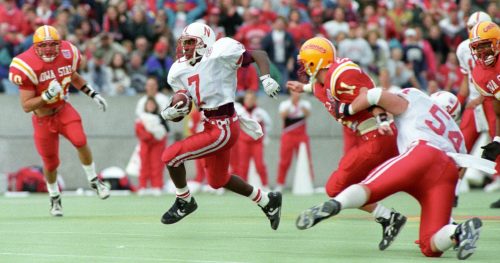
Excerpted from Chapter 94, No Place Like Nebraska: Anatomy of an Era, Vol. 2 by Paul Koch
Traditionally, we give a great deal of authority and, accordingly, much responsibility to the leader for the success of the team. This is just plain wrong. Over the long haul, a team will not be successful if the leader carries the sole responsibility for ensuring that the team reaches its goals. Leadership of the team must be shared among team members. This is one of the most important concepts of team effectiveness, but it is also the most difficult to teach.
-Glenn M. Parker, Team Players and Teamwork, 2008 (Reproduced with permission of John Wiley & Sons, Inc.)
Having just finished up with a leader from the defensive line of the 60 & 3 era in the previous chapter, we now encounter his equal and opposing counterpart from the O-line’s Pipeline: Center Aaron Graham.
The practice day parries and tales of combat between Aaron and Christian alone could fill a volume, the book’s dust jacket most certainly displaying the colors of turf, mud & caked-on blood. Such was the vehement desire to rise to prominence, to dominate decidedly, to exert their will upon the other. Theirs was a repeating war for no-man’s land played out over the course of a college career while they simultaneously refined their respective crafts, goading and attempting to grind to powder the bravado of the other. The trenches were a trough of great abundance as a result, and Aaron has parlayed his achievements and experiences into a rewarding post-football life.
He, too, was a difficult man to pin down, and I was lucky to catch him on a cell phone as he hauled his way down a snowy road on the way to a business meeting one winter Nebraska day. It was a fun ride… because Aaron rarely sits still. So jump on in and hold on. Tightly…
Notable quote #1:
“You go through the list of the guys behind that ‘94 offensive line: the Aaron Taylors, and Matt Hoskinsons and Jon Zatechkas and Fred Pollacks and Eric Andersons and Chris Dishman. I don’t think they were the same players without us there, and I don’t think we were the same players without them there, because those guys made us work harder and we had to prove to them every day why we were the best, and to leave more or less a legacy with those guys. The Nebraska offensive line dominance had been there for a long time, but we had a collective thought process amongst us that we didn’t want to be good, didn’t want to be pretty good, we wanted to be the best.”
Aaron Graham
Scholarship recruit, Center, Denton, Texas
Where are they now? Gretna, Nebraska, Real Estate Broker
Question: Hey Aaron, so you’re busy brokering these days?
Aaron Graham: Yeah, I own a recreational real estate brokerage company called Premier Outdoor Properties Incorporated, and we specialize in selling recreational real estate. The best way to put it is: we sell recreational farm and ranch properties, sell lakes and rivers, hunting and fishing properties, equestrian facilities and acreages. I’m a licensed broker in Nebraska, Kansas and Iowa.
Q: Selling the heartland: Bucks, beavers, birds & bass, huh?
AG: Well, where we live is considered to be the Mixed-bag Capital of the World when it comes to wildlife. We have everything from whitetail deer to turkey to elk to antelope to some of the best waterfowl hunting in the world. And you know, I got involved shortly after I retired from the NFL. I was looking for my own recreational property, and there was a need for this type of real estate brokerage, for somebody to be able to sell to me what I was looking for. I was the first broker to become a participating broker with Cabela’s Trophy Properties, and we’ve since grown and have about thirty billion dollars worth of properties being marketed now.
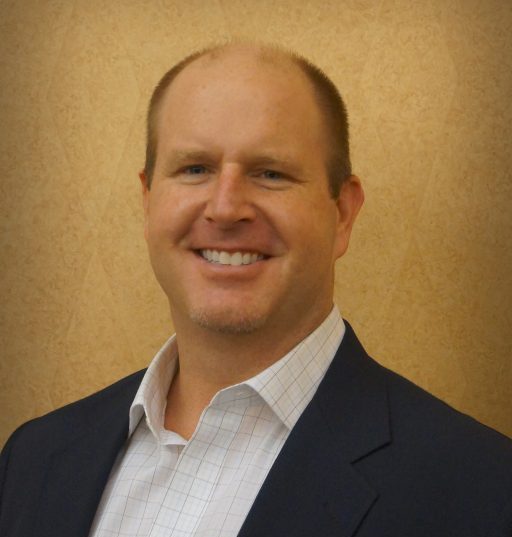
Q: So it’s keeping you very busy?
AG: Yes, it is.
Q: Aaron, any offense worth its weight starts on the offensive line, and you were a major hinge upon which that line swung. Let’s start out by asking: you were from Texas, right?
AG: Yes. Denton, Texas. It’s north of Dallas. Dallas-Fort Worth area.
Q: That crazy area where the 35 West and 35 East come together into the 35 north?
AG: That’s right.
Q: (laughs) I’ve traveled through that part of the country quite a few times. So how did you become a Husker?
AG: Well, I tell ya’, I was pretty set on staying within the state of Texas. I did not necessarily come from a high school powerhouse where I grew up. I came from a good high school -Denton High School- but I was the only Division I player on my high school team. I don’t know if there were any other individual players in the years before me or after me; I was just the only guy who went on to play Division I football. (There was a basketball player from my high school by the name of Mario Bennett who went on to play in L.A. with the Lakers when Shaq was there, but there wasn’t a lot of others.) We were a .500 ball club just about all three years that I was there at Denton High, and it really kind of went a little unnoticed in the city. I remember, I didn’t even make the State’s Top 100 players. Actually, I didn’t even make the Top 100 players in the Dallas-Ft. Worth Metro area. To me that was a real driving force as I moved toward Nebraska, because I did have the opportunity to play at some bigger schools.
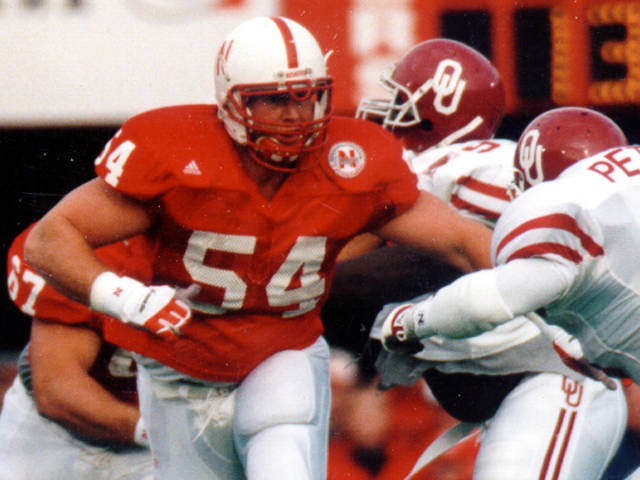
My first pick was originally to go to Texas A&M. I visited the University of Texas, Texas Tech and then also went to the University of Oklahoma. But as I was going through my senior season there was a kid from Dallas Carter High school, a really famous Texas high school known for producing good football players, who had committed to Texas A&M -and they offered him a scholarship. And again, it kind of left that pit, that feeling in my stomach, that as a child growing up that’s where I thought, ‘If I had the opportunity to play college football, that’s where I really wanted to go.’ My heart went that direction. And I remember, when he committed I immediately turned around and told my parents that I was interested in going up to the University of Nebraska. We had conversations about it and it was 600 miles from home, the furthest place away from home that I’d really taken an interest in.
I’d always been a Cornhusker fan. Always. But had never been to a Nebraska game. Back in the heyday with Mike Rozier and Irving Fryar and Turner Gill, we’d sit around on Saturdays with my buddies and watch Nebraska dominate the teams they played against. And because of that one of my buddies down the road, a lifelong friend of mine, he had what we called ‘The Triplets Poster’ in his room…
Q: The Scoring Explosion poster?!
AG: The Scoring Explosion poster, that’s correct. It was in his room and it was always a constant reminder when I was a kid playing around. I’d come around and I’d see that poster and just say, ‘Man!’ Nebraska always had a special place in my heart.
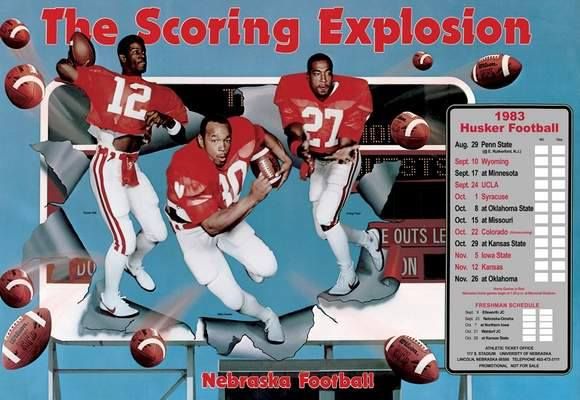
Well, when everything shook down at Texas A&M I decided to take an official visit to go see the University of Nebraska, and when I returned and got off the plane I told my parents that the decision had been made: I was going to Nebraska.
And people asked me, “What really was it that made you pick Nebraska?” There were a lot of things: being 17, 18 years old and walking into that weightroom and seeing history on the walls, you were just blown away. It was miles ahead of Texas A&M and the University of Texas as far as their program from facilities and stuff to the training table.
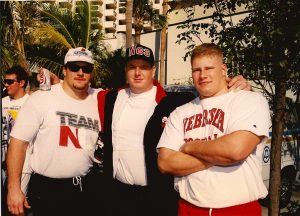
But the most important thing was that I had the opportunity to watch them practice for the bowl game, and I think it was ’91 and they were playing Georgia Tech in the Citrus Bowl or something. And I watched a few guys in that particular practice: they were Will Sheilds, Zach Wiegert, Brenden Stai, Rob Zatechka and Joel Wilks. They were young freshmen and a sophomore and I looked at those guys and I saw their abilities and how they practiced and how they worked, and I made my decision of saying, ‘Hey, I want to go be a part of that group.’ The biggest driving force of what I saw there was them, of just having the chance to see them and shake their hand and meet them and to say, ‘Just a couple years down the road -two or three years- that offensive line is gonna be pretty good.’
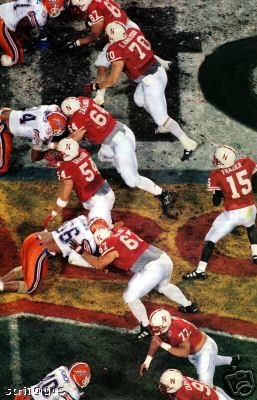
Q: So you could envision plugging yourself into that group’s mix?
AG: Yeah, I noticed the one position they were missing was the center. My decision-making process became very, (laughs) definitely easy. I could see at that time, being 17-18 years old, that they had talent in the group that was ahead of me. You didn’t know about the group you’d be going in there with, but I certainly knew that Nebraska had a bright future with the individuals who were kind of in line for the future: the Pipeline, if you will.
Q: You arrived on campus the fall of ’91?
AG: Yeah, that’s right.
Q: Any first impressions? Anything take you aback?
AG: Well, it was a very difficult time for me, because after I’d committed and signed to the University of Nebraska I’d lost my mom to leukemia in the spring of 1991. So I left Texas shortly thereafter, a month later, and spent summer going to school, getting in the gym and getting ahead because I knew fall was going to be a very busy time. I’d talked to my dad and you know what? I felt uncomfortable leaving at that time. But my dad thought it was in my best interests that we just ‘stick to the plan’, so to speak. So my time there during summer and that first part of my experience was obviously very difficult, being away from home and then going through that tragedy that I did.

Available on Amazon.com
But the experience in itself made me grow in so many ways. I felt it made me a better person and also even made me a better football player, because everything I’d been through at that point: it made me play for my family, my loved ones. You learned how precious life is, how short life is. So it was easy when I heard the cliché speeches about “Go your hardest every day” or “Make every day as if it’s your last” or “Leave everything out on the field.” It was much easier to understand. You know, that’s one thing I’m very proud of -not only in college but in my professional career- is that I gave the game of football every single thing that I could every single day, and none as much as everything I did at the University of Nebraska. The great thing was that the guys who I played with had the same drive and desire to practice harder than anybody, work harder than anybody, and be the absolute best that we could be.
Q: Did you always have that drive, that personal motor? That motivation?
AG: I did. I’ve always, even to this day, still been a very driven individual. And as a young junior high and even a high school athlete, I wasn’t necessarily the best athlete on my team. Obviously I had enough size that I knew if I worked hard enough I could put myself in the position to maybe get an opportunity. But I got every single ounce out of my athletic ability that I could. And for some people who were more genetically blessed than I was or what have you, I had to work harder to be able to achieve the goals I wanted to.
Q: No regrets?
AG: No regrets at all. That’s the one thing: I could play the game of football with a sense of completeness, that I gave everything I had to the game I so dearly loved. And I probably could have played fifteen years in the NFL but I simply couldn’t anymore, because my body couldn’t handle it anymore.
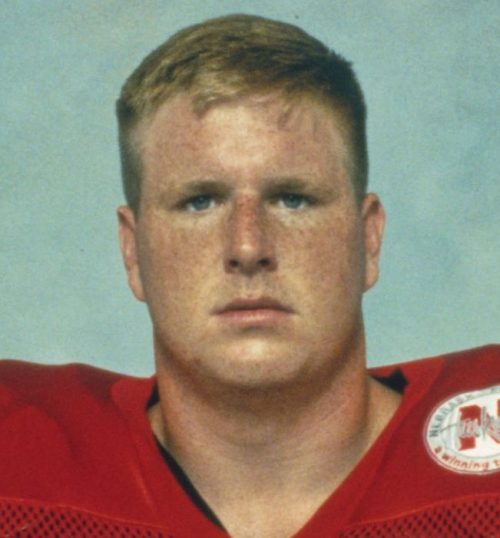
Q: From your first day at Nebraska to the last, touch upon the change in the culture. Any memories?
AG: I think the most important thing was… (and really, the ’94, ’95 era will tell you), they might tell you that the culture change we had was more so about convincing Coach Osborne that we had to develop a greater sense of confidence in what we were doing… to the point where we had a list of goals in our team meeting room that we looked at every time we gathered together as a team. That list of goals would say things like, “Win the Big 8 Championship, Go Undefeated in Big 8 Conference play, Go Undefeated in regular season play” and then it would say something like “Go to the January 1 Bowl Game.” And then it would be “Win the Bowl Game.” What we changed in that ’94 season (and it was a very difficult thing for Coach Osborne to do), but he allowed us to where we changed that final goal to say, “Win the National Championship.” That was our goal. Coach Osborne –who we all loved and adored- for him it was a difficult thing, because he always felt that if we didn’t achieve that goal, then it wouldn’t have been a success for him and the team.
What happened in ’93 was, we went to the darn ’93 national championship game and we lost the darn national championship with one second to play, and our goal was now very simple and clear, because “That was not good enough and that was a disappointing season.” Finishing number two felt like crap. And the reality of it is: we all -the players- had made the decision to say, “We’re now not going to accept anything less than winning that game.” And we got Coach Osborne to agree with us, to say, “We’ve been there, we’ve done that. We’ve won all our regular season games. We’ve won our conference. We’ve played in a January 1 bowl game. We’ve done all of that.” The reality of it was that we were in the position to win the national championship and we came up short. So next year’s team goal, our final goal: It was to win the national championship.
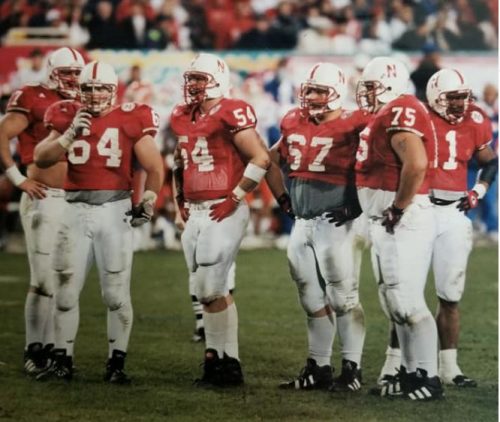
Q: Aaron, how was that communicated to Coach Osborne? Your wanting to change that goal?
AG: It was a team meeting. And I remember it vividly. We were setting our team goals, and for him it was not an easy deal -after losing to Florida State- it was not easy for him to allow us to do that. We talked about it and communicated, and people stood up and gave their opinions. And it was a consensus to say, “If we’re gonna do this we’re all gonna have to be on the same page, but that is our goal. Our goal isn’t to go to a bowl game or just go undefeated, it’s to win the national championship.” And you know, he lifted his hands up and in typical T.O. style looked at us and kind of gave us his acknowledgement of “That’s what we’re gonna do. That’s gonna be our goal.” We took a vote on it as a team, and that’s what we voted.
Q: He was kind of like, “Okay, guys. Alright. Despite my concerns you’ve convinced me. Let’s vote on it.”? (laughs)
AG: Right. And then it was about convincing him to say… it was about putting us all on the same page. And when you do that -even from a coach’s perspective you could say you’re kind of putting your neck out there. You’re saying, “If we don’t win the national championship then I’m letting them down.” But that’s what we ultimately ended up agreeing on. And we all put our name and our stamp on it. That that was our goal: to win the national championship.
Q: I’ve spoken to Coach Osborne about this, and it seems the motivation, the drive that a lot of the guys on that team exhibited, it seems that that drive, that motor, if you will, is innate. He feels that you can’t really teach that. Would you say a large number of the members on that team had that drive, that motor, that urge to conquer and overcome?
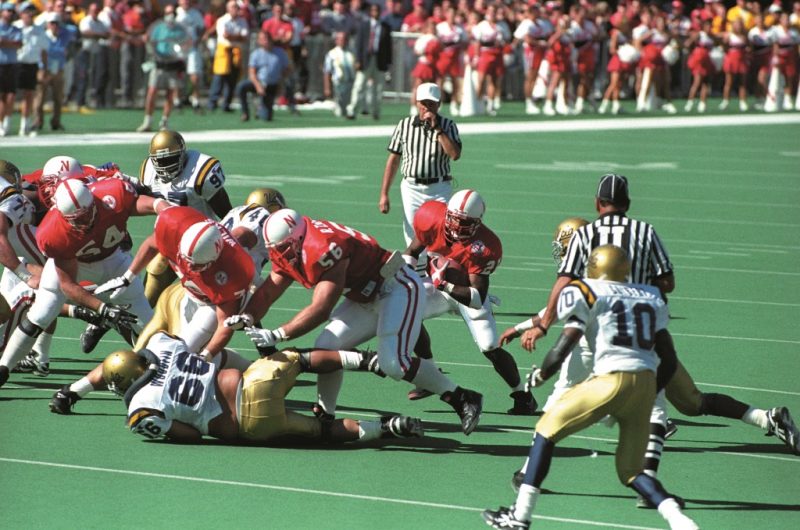
NU’s Pipeline Pancake
Nebraska, 48 vs UCLA, 21
Memorial Stadium
September 17, 1994
AG: I think we had enough people who had that special drive, and that it became bigger and contagious, infectious. It almost became a necessity for everybody to have that same drive. And the thing about it is, you go through the list of the guys behind that ’94 offensive line and the Aaron Taylors and Matt Hoskinsons and Jon Zatechkas and Fred Pollacks and Eric Andersons and Chris Dishman, I don’t think they were the same players without us there, and I don’t think we were the same players without them there. Because those guys made us work harder and we had to prove to them every day why we were the best and to leave more or less a legacy with those guys. The Nebraska offensive line dominance had been there for a long time, but we had a collective thought process amongst us that we didn’t want to be good, we didn’t want to be pretty good; we wanted to be the best. That was a big goal, internally.
And you talk about it from a goal-setting perspective for the offensive line? Our goals were ridiculous: Rush for 400 yards per game, don’t get any penalties, don’t give up a sack. The numbers were staggering. I confuse the numbers between ’94 and ’95 sometimes, but in ’94 I think we gave up two sacks and in ‘95 we didn’t give up a sack.
Q: Wow!
AG: “Yeah, but you were a running team,” people might say. Well, you go back and you look: Tommie Frazier threw the ball an average of something like 17 times a game. It wasn’t like we couldn’t throw the ball at all.
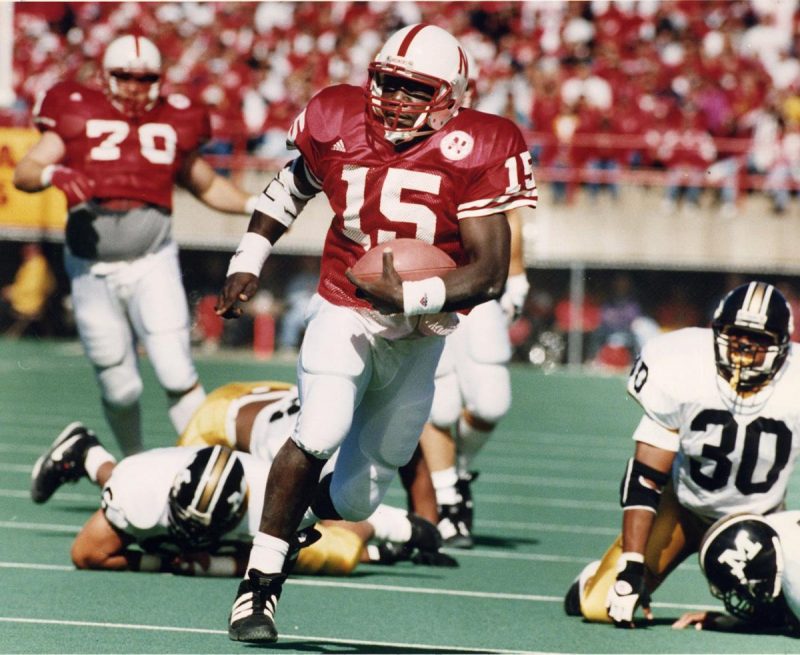
Q: I was looking at the stats, Aaron, and I was amazed at how many touchdown passes Tommie had.
AG: Yeah, exactly. And we had to be able to protect him.
To be continued….
Copyright @ 2013 Thermopylae Press. All Rights Reserved.
Photo Credits : Unknown Original Sources/Updates Welcomed
Author assumes no responsibility for interviewee errors or misstatements of fact.